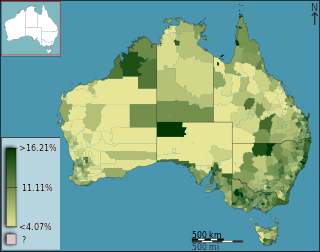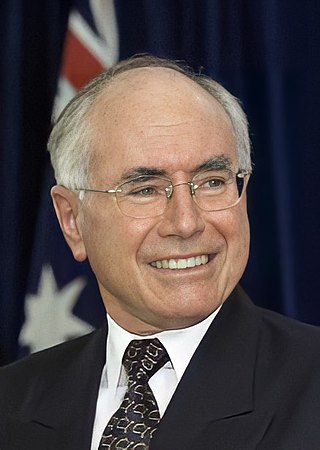Medicare is the publicly funded universal health care insurance scheme in Australia, along with the Pharmaceutical Benefits Scheme (PBS) operated by the nation's social security department, Services Australia. Medicare is the principal way Australian citizens and permanent residents access most health care services in Australia. The scheme either partially or fully covers the cost of most primary health care services in the public and private health care system. All Australian citizens and permanent residents have access to fully-covered health care in public hospitals, funded by Medicare, as well as state and federal contributions. International visitors from 11 countries have subsidised access to medically necessary treatment under reciprocal agreements.

Kevin Michael Rudd is an Australian diplomat and former politician who served as the 26th prime minister of Australia from 2007 to 2010 and June 2013 to September 2013. He held office as the leader of the Australian Labor Party (ALP). Rudd has been the 23rd and current ambassador of Australia to the United States since 2023.

Wayne Maxwell Swan is an Australian politician serving as the 25th and current National President of the Labor Party since 2018, previously serving as the 14th deputy prime minister of Australia and the deputy leader of the Labor Party from 2010 to 2013, and the treasurer of Australia from 2007 to 2013.
The phrase "hardworking families" or "working families" is an example of a glittering generality in contemporary political discourse. It is used in the politics of the United Kingdom and of the United States, and was heavily used by the political parties in the campaign of the 2005 United Kingdom general election and the 2007 Australian federal election where the Rudd Labor Party used the term extensively.
Income tax in Australia is imposed by the federal government on the taxable income of individuals and corporations. State governments have not imposed income taxes since World War II. On individuals, income tax is levied at progressive rates, and at one of two rates for corporations. The income of partnerships and trusts is not taxed directly, but is taxed on its distribution to the partners or beneficiaries. Income tax is the most important source of revenue for government within the Australian taxation system. Income tax is collected on behalf of the federal government by the Australian Taxation Office.
Battlers, in Australian colloquialism, are ordinary working-class people who persevere through their commitments despite adversity. Typically, this adversity comprises low pay, family problems, environmental hardships and personal recognition woes. It is a term of respect and endearment intended to empower and recognise those who feel as though they exist at the bottom of society. It has seen recent use in mainstream politics to describe a demographic of Australian people, most notably by former Prime Minister John Howard, who used it to describe his working-class voting base.
The Prices and Incomes Accord was a series of agreements between the Australian Labor Party (ALP) and the Australian Council of Trade Unions (ACTU), in effect from 1983 to 1996. Central to these agreements was an incomes policy to address the stagflation crisis by restraining wages. The unions agreed to restrict their wage demands, and in exchange, the government provided a 'social wage' of welfare and tax cuts.

The Third National Government of New Zealand was the government of New Zealand from 1975 to 1984. It was an economically conservative government that aimed to preserve the Keynesian economic system established by the First Labour government and was also socially conservative. Throughout its three terms it was led by Robert Muldoon, a populist but antagonistic politician who was sometimes described as the National Party's best asset and worst liability.
Social security, in Australia, refers to a system of social welfare payments provided by Australian Government to eligible Australian citizens, permanent residents, and limited international visitors. These payments are almost always administered by Centrelink, a program of Services Australia. In Australia, most payments are means tested.

Health care in Australia operates under a shared public-private model underpinned by the Medicare system, the national single-payer funding model. State and territory governments operate public health facilities where eligible patients receive care free of charge. Primary health services, such as GP clinics, are privately owned in most situations, but attract Medicare rebates. Australian citizens, permanent residents, and some visitors and visa holders are eligible for health services under the Medicare system. Individuals are encouraged through tax surcharges to purchase health insurance to cover services offered in the private sector, and further fund health care.

The Howard government refers to the federal executive government of Australia led by Prime Minister John Howard between 11 March 1996 and 3 December 2007. It was made up of members of the Liberal–National Coalition, which won a majority of seats in the House of Representatives at four successive elections. The Howard government commenced following victory over the Keating government at the 1996 federal election. It concluded with its defeat at the 2007 federal election by the Australian Labor Party, whose leader Kevin Rudd then formed the first Rudd government. It was the second-longest government under a single prime minister, with the longest having been the second Menzies government (1949–1966).

The Hawke–Keating government is an all-encompassing term to describe the duration of the Hawke government and the Keating government, which together spanned from 11 March 1983 to 11 March 1996. Both governments were formed by the Australian Labor Party, and were led from 1983 to 1991 by Bob Hawke as Prime Minister, and from 1991 to 1996 by Paul Keating as Prime Minister, with Keating serving as Treasurer throughout the Hawke government. During the Hawke–Keating government, the Labor Party won five successive federal elections, its most electorally successful period to date; the 13-year uninterrupted period of government also remains the Labor Party's longest spell in power at the federal level.

The 2008 Australian federal budget for the Australian financial year ended 30 June 2009 was presented on 13 May 2008 by the Treasurer of Australia, Wayne Swan, the first federal budget presented by Swan, and the first budget of the first Rudd government.

The Hawke government was the federal executive government of Australia led by Prime Minister Bob Hawke of the Australian Labor Party (ALP) from 1983 to 1991. The government followed the Liberal-National Coalition Fraser government and was succeeded by another Labor administration, the Keating government, led by Paul Keating after an internal party leadership challenge in 1991. Keating was Treasurer through much of Hawke's term as prime minister and the period is sometimes termed the Hawke-Keating government.
Beginning in 2008 many nations of the world enacted fiscal stimulus plans in response to the Great Recession. These nations used different combinations of government spending and tax cuts to boost their sagging economies. Most of these plans were based on the Keynesian theory that deficit spending by governments can replace some of the demand lost during a recession and prevent the waste of economic resources idled by a lack of demand. The International Monetary Fund recommended that countries implement fiscal stimulus measures equal to 2% of their GDP to help offset the global contraction. In subsequent years, fiscal consolidation measures were implemented by some countries in an effort to reduce debt and deficit levels while at the same time stimulating economic recovery.

The 2009 Australian federal budget for the Australian financial year ended 30 June 2010 was presented on 12 May 2009 by the Treasurer of Australia, Wayne Swan, the second federal budget presented by Swan, and the second budget of the first Rudd government. Swan commented that the budget would be tougher than in previous years. "Projected government revenue has fallen by $200 billion since the last budget because of the global economic crisis."

The Gillard government was the Government of Australia led by the 27th Prime Minister of Australia, Julia Gillard, of the Australian Labor Party. The Gillard government succeeded the first Rudd government by way of the Labor Party leadership spill, and began on 24 June 2010, with Gillard sworn in as Prime Minister by the Governor-General of Australia, Quentin Bryce. The Gillard government ended when Kevin Rudd won back the leadership of the Australian Labor Party on 26 June 2013 and commenced the second Rudd government.

The 2013 Australian federal budget for the Australian financial year ended 30 June 2014 was presented on 14 May 2013 by the Treasurer of Australia, Wayne Swan, the sixth federal budget presented by Swan. The 2013 budget estimated total revenue of A$387.7 billion and spending of A$398.3 billion, a deficit of A$18 billion, with a return to surplus expected in the 2015 Australian federal budget. Some of the measures in the budget had been announced by various Ministers before the budget.

The 2014 Australian federal budget was the federal budget to fund government services and operations for the 2014/15 financial year. The 2014 budget was the first delivered by the Abbott government, since the Coalition's victory in the 2013 Australian federal election. Treasurer Joe Hockey presented the budget to the House of Representatives on 13 May 2014.

The 2018 Australian federal budget was the federal budget to fund government services and operations for the 2018–19 financial year. The budget was presented to the House of Representatives by Treasurer Scott Morrison on 8 May 2018. It was the fifth budget to be handed down by the Liberal/National Coalition since their election to government at the 2013 federal election, and the third and final budget to be handed down by Morrison and the Turnbull government.







